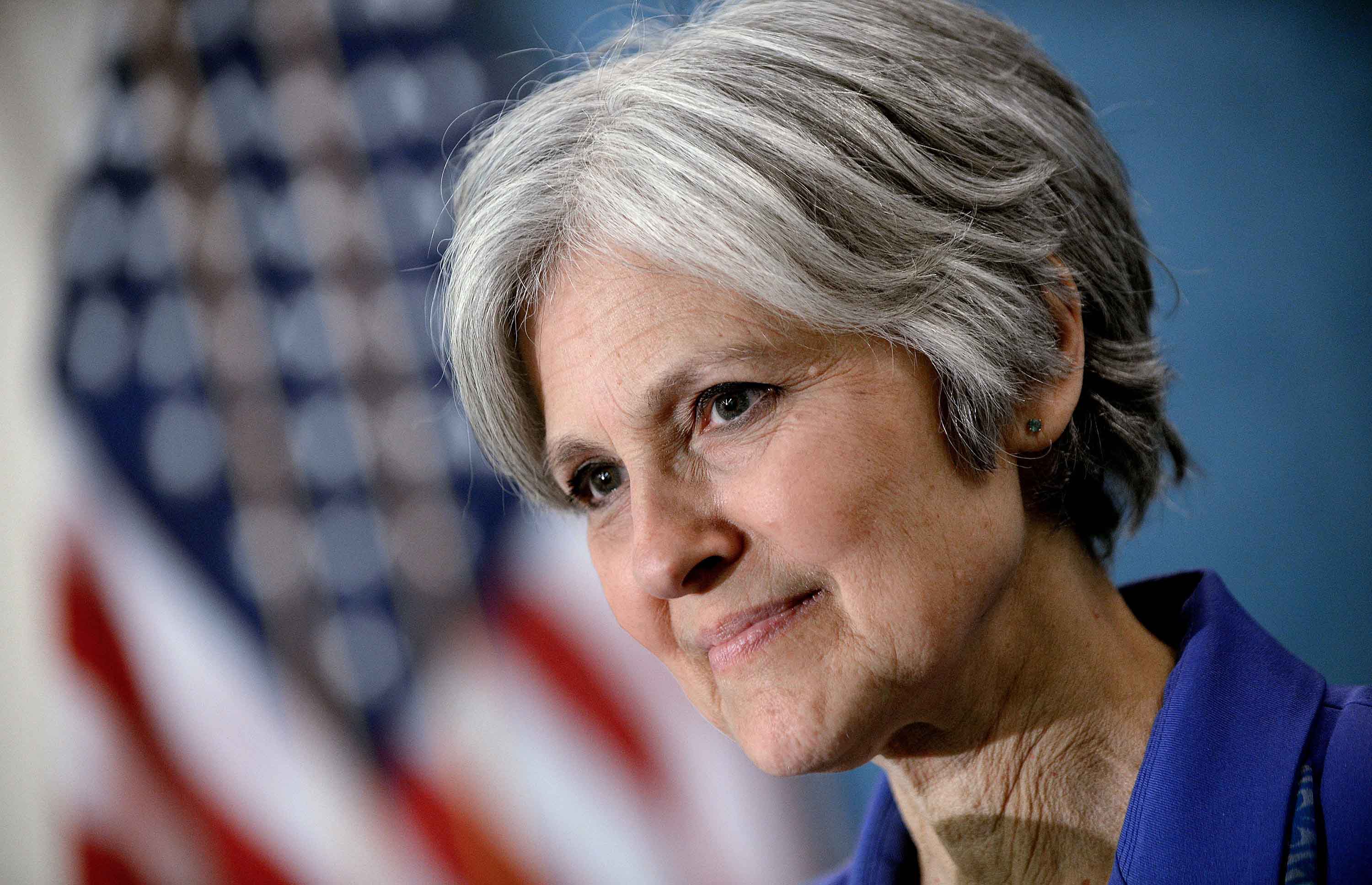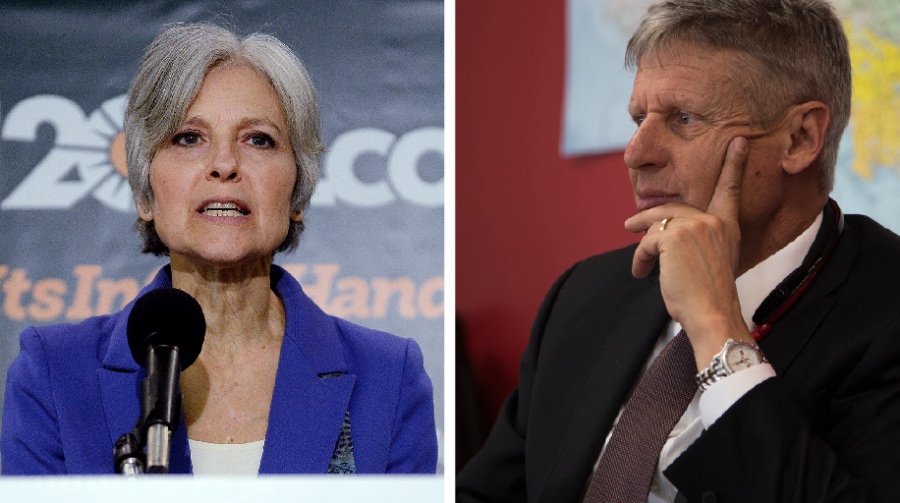SIU pundits talk third party influence on 2016 presidential election
Green Party presidential candidate Jill Stein and Libertarian presidential candidate Gary Johnson. (TNS)
October 3, 2016
Trinidad Vicente will vote for the first time in her life come November and she has already decided to support Democratic presidential nominee Hillary Clinton.
It’s not because she thinks Clinton will be a great leader. She simply detests Republican presidential nominee Donald Trump.
“He’s an awful choice for America,” Vicente, a freshman from Centralia studying mathematics, said during an interview Sunday.
Advertisement
Like many young voters, Vicente said she feels as through she has to choose between two unfavorable options, and pick the lesser of two evils. While she sees third party candidates as an option, she does not believe a vote in that direction will help the country.
“I think it’d be better to vote for a third party than not at all, because at least then whoever does win knows that there are people who care about third party issues,” Vicente said.
A survey of voters by the Pew Research Center found 41 percent of millennial voters identify with an independent party, making them the largest group to stray from the two-party system. And with five weeks remaining before Election Day, the Clinton and Trump campaigns are vying for the pool of voters who remain on the fence.

But Libertarian candidate Gary Johnson and Green Party candidate Jill Stein are in the race, too.
Nearly 10 percent of Americans are considering casting votes for Libertarian or Green Party presidential candidates this November, according to polling averages from Real Clear Politics.
It’s when large percentages of voters are unhappy with major party candidates that the contest becomes “fertile ground for third party votes to surge,” said John Jackson, a visiting political science professor at the Paul Simon Public Policy Institute who is an expert on U.S. presidential elections.
If you ask Jackson, voting for a third party is throwing your vote away.
Advertisement*
“Vote third party if it makes you feel good,” Jackson said. “It’s not going to make any difference or have any impact on public policy.”
Election data from the Federal Election Commission shows that a third party candidate has not received more than 1 percent of the total popular vote in the last four presidential elections.
Jackson said this is due in part to the “winner-take-all” system most of the electoral college abides by, excluding Maine and Nebraska. This system awards electoral votes to the candidate who wins a plurality of the popular vote as opposed to the majority. No representation is given to the party that earns the second or third largest chunk of votes.

For individual voters, Jackson said, voting for a third party candidate is a waste because those candidates won’t have enough support to win electoral votes and thus have no chance of becoming president. The country has operated on virtually the same two-party system since the Republicans ran a successful campaign for the presidency in the mid-1800s.
“If third parties haven’t won since 1860, the argument that the Libertarians aren’t going to win and the Greens aren’t going to win is pretty compelling,” Jackson said.
Though some third party supporters will decide late to vote for a major party, Jackson said others will decide not to vote at all. These non-voters are more likely to be the younger ones.
“Young people have lousy educations about the issues, so it gets to be the cool thing to say ‘I’m just going to stay home.’ Well, if you’re just going to stay home, you have effectively supported the winner because you didn’t bother to vote,” Jackson said.
Jackson said there have been instances in which third party candidates have drawn away a large enough fraction of voters from a major party candidate that the opposing major party won the presidency as a result. This was the case with the 2000 presidential election, when Green Party candidate Ralph Nader drew enough votes away from Democrat Al Gore to tip the state of Florida in Republican George W. Bush’s favor.
“Some [Green Party members] look back on that and say, ‘Al Gore was an environmentalist, so why would I want Bush in power?’” Jackson said.
David Yepsen, director of the Paul Simon Public Policy Institute, said millennial voters may be drawn to third party candidates because of the recession they grew up in.
“Their aspirations have been limited, and they’re concerned about the things that made that happen,” Yepsen said. “A millennial hears a candidate complaining about banks, about high debt, and they say ‘Hey that’s me, that’s why I’m not able to do the things my parents did…’ They want candidates who do something about it.”

Third party candidates often raise issues that become popular enough to be adopted into the ideologies of the Democratic or Republican parties. Yepsen said this factor tends to restrict the growth of third parties because the flexibility of the two major parties allows them to evolve based on third party movements.
Those that do cast votes for third party candidates should think about possible negative consequences of doing so, Yepsen said.
“If you feel strongly enough about an issue, you can make a statement,” Yepsen said. “But most Americans prefer to make a president.”
Yepsen said although third party candidates don’t usually win elections, they tend to affect change within the two major parties.
“It’s not the candidate that has a chance,” Yepsen said. “It’s their ideas that are important.”
Staff writer Marnie Leonard can be reached at [email protected] or on Twitter @marsuzleo.
To stay up to date with all your SIU news, follow the Daily Egyptian on Facebook and Twitter.
Advertisement









otto • Oct 4, 2016 at 3:35 pm
Illinois has enacted the National Popular V0te bill.
By 2020, the National Popular Vote bill could guarantee the presidency to the candidate who receives the most popular votes in the country, by changing state winner-take-all laws (not mentioned in the U.S. Constitution, but later enacted by 48 states), without changing anything in the Constitution, using the built-in method that the Constitution provides for states to make changes.
Every vote, everywhere, for every candidate, would be politically relevant and equal in every presidential election.
The bill would take effect when enacted by states with a majority of the electoral votes—270 of 538.
All of the presidential electors from the enacting states will be supporters of the presidential candidate receiving the most popular votes in all 50 states (and DC)—thereby guaranteeing that candidate with an Electoral College majority.
The bill was approved this year by a unanimous bipartisan House committee vote in both Georgia (16 electoral votes) and Missouri (10).
The bill has passed 34 state legislative chambers in 23 rural, small, medium, large, red, blue, and purple states with 261 electoral votes.
The bill has been enacted by 11 small, medium, and large jurisdictions with 165 electoral votes – 61% of the 270 necessary to go into effect.
NationalPopularVote
otto • Oct 4, 2016 at 3:34 pm
In ordinary plurality voting a vote cast for a splinter candidate generally produces the politically counter-productive effect of helping the major-party candidate whose views are diametrically opposite to those of the voter.
For example, votes cast for Libertarian Party candidate Bob Barr made it easier for Democrat Barack Obama to win North Carolina in 2008.
The current state-by-state winner-take-all system does not protect the two-party system. It simply discriminates against third-party candidates with broad-based support, while rewarding regional third-party candidates. In 1948, Strom Thurmond and Henry Wallace both got about 1.1 million popular votes, but Thurmond got 39 electoral votes (because his vote was concentrated in southern states), whereas Henry Wallace got none. Similarly, George Wallace got 46 electoral votes with 13% of the votes in 1968, while Ross Perot got 0 electoral votes with 19% of the national popular vote in 1992. The current system punishes third-party candidates whose support is broadly based.